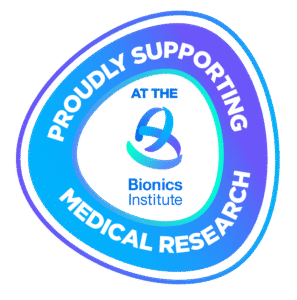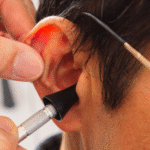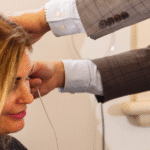For Physicians/Research Studies
The latest research on hearing loss
Click on the headings below to explore the corresponding research studies.
Importance of Early Intervention
Addressing hearing loss early can reduce the risk of cognitive decline and dementia. Studies have demonstrated that every 10-decibel decrease in hearing ability correlates with a 16% increased risk of dementia. Early intervention, such as using hearing aids, can help preserve cognitive health and prevent further decline, emphasizing the need for timely diagnosis and treatment.
Dementia and Hearing Loss
Long-term studies have shown that untreated hearing loss significantly increases the risk of dementia. A 21-year study revealed that even mild hearing loss is associated with a 36% higher risk of developing dementia. This underscores the importance of early hearing interventions in protecting cognitive function and slowing the onset of cognitive decline.
Hearing Loss and the Risk of Falls
Hearing impairment doesn’t just affect communication—it also increases the risk of falls and mobility issues. Research published in The Journal of Gerontology found that older adults with hearing loss are 1.5 to 2 times more likely to experience mobility problems and 2.2 times more likely to suffer frequent falls. This highlights the critical connection between untreated hearing loss and physical health, particularly in preventing injuries and maintaining balance.
Hearing Aids on Cognition
A 2023 NIH study tracked nearly 1,000 adults aged 70-84 over three years and found that those at high risk of dementia who used hearing aids experienced a 50% reduction in cognitive decline. This shows that hearing aids not only improve hearing but can also significantly slow cognitive deterioration in vulnerable populations, highlighting their role in protecting brain health.
Early Intervention and Reducing Long Term Costs
The WHO estimates that untreated hearing loss results in an annual global economic burden of $980 billion. Early diagnosis and the use of hearing aids can significantly reduce these costs by preventing complications such as depression, social isolation, and falls. Investing in hearing care early not only preserves cognitive and physical health but also helps to reduce the need for more expensive care later in life.
Hearing Loss and Mental Health
Hearing loss has a profound impact on mental well-being. A study published in JAMA Network Open found that individuals with hearing loss were more likely to experience psychological distress and seek mental health services. However, the use of hearing aids was shown to reduce psychological distress, improving overall mental health and quality of life.
The Role of Hearing in Overall Health
Hearing aids don’t just improve hearing—they can also extend life. A study published in The Lancet Healthy Longevity found that individuals who regularly used hearing aids had a 27% lower risk of mortality compared to non-users, even after adjusting for age, sex, and pre-existing conditions. Hearing aids promote better mental health, social engagement, and cognitive function, all contributing to long-term health and longevity.
Supporting Hearing & Medical Research
At NeuroHearing, we believe great hearing care is built on strong science. That’s why we make an ongoing monthly contribution to the Bionics Institute, a Melbourne-based medical research organisation internationally recognised for its work in hearing and neural technologies.
The Institute is best known for its role in advancing cochlear implant technology and continues to lead research into hearing loss, tinnitus, and brain-based hearing processing. Beyond hearing, the Bionics Institute also conducts research into other neurological and sensory conditions, including vision and chronic pain, using advanced bionic and neurotechnology approaches. Our contribution helps support independent research aimed at improving diagnosis, treatment, and quality of life for people now and into the future.

When should you refer to an audiologist?
What types of hearing assessments do you provide?
We offer comprehensive hearing assessments, including pure-tone audiometry, speech discrimination testing, tympanometry, and otoscopy, to diagnose hearing loss and recommend appropriate interventions.
What conditions warrant a referral?
Patients experiencing signs of hearing loss, tinnitus, difficulty understanding speech, balance issues, or those at risk of cognitive decline may benefit from a referral for a comprehensive hearing evaluation.
How do you collaborate with GPs to manage patients with hearing loss?
We work closely with GPs to ensure seamless communication and coordinated care. After each assessment, we provide detailed reports and recommendations to support your patient’s overall health and hearing management.
Can you help with earwax removal?
Yes, we offer professional earwax check and removal services to ensure patients’ ears are clean and clear, which helps improve hearing aid effectiveness and overall hearing health.
What are the potential consequences of untreated hearing loss?
Untreated hearing loss can have wide-ranging effects on an individual’s health and quality of life, including:
- Increased risk of falls and balance issues
- Impaired memory and cognitive decline
- Reduced job performance and earning potential
- Higher likelihood of depression and social withdrawal
- Feelings of loneliness and isolation
- Increased irritability, anger, fatigue, tension, and stress
- Social rejection and strained relationships
- Reduced alertness and personal safety risks
- Difficulty learning new tasks
- Overall diminished psychological and physical health
By addressing hearing loss early, many of these consequences can be prevented, leading to better overall well-being.
Did you know we offer customized on-site staff training for your facility?
Our tailored training sessions cover a range of important topics, including:
- How to implement a hearing screening program
- Proper handling and care of hearing aids
- Techniques for safe and effective earwax removal
- Best practices for communicating effectively and safely with patients who have hearing difficulties
We design our training to fit the unique needs of your facility, ensuring your staff is equipped to provide the best care possible.
Melbourne's Leading Audiology Clinic
Keep your hearing in top health with NeuroHearing audiology clinic, Melbourne. Book an appointment today!
Get in touch
Location
215 Canterbury Road
Canterbury VIC 3126
(2 hour parking at the rear)
Contact Us
Opening Hours
Mon - Thurs: 9:30 am - 5:00 pm
Fri: 10:00 am - 5:00 pm

Submit an enquiry
Our friendly team would love to hear from you.
"*" indicates required fields




